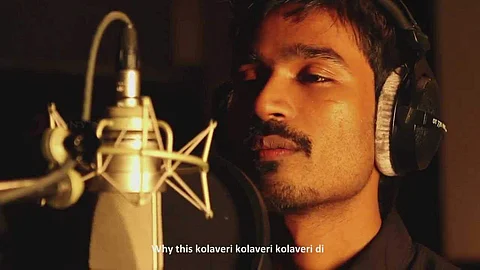

It’s hard to wrap your head around big numbers. Take the number, 133 million, for instance. How much is it really? Do we truly get the ginormity of it when we use it? For the sake of clarity, let me tell you it’s the total population of Russia. It’s also the sum total of all the people living in Argentina, Spain AND South Africa. For the purposes of this story, it is the number of times the official video of Why This Kolaveri Di — which completed its sixth anniversary this past week — has been watched on YouTube. It’s a mind-boggling figure. I remember what a big deal it was in late 2011, when the song crossed the 1 million figure. And then, it hit the 10 million mark. People, to borrow a new-age expression, lost it. They wrote about it, talked about it, tried to analyse its success, heralded the arrival of the new composer in town. The years have passed, but the numbers show no signs of abating. Perhaps the most pleasing takeaway from the inexplicable popularity of this song is that it didn’t come due to over-the-top gimmickry or any inherent stupidity. YouTube videos often go viral because they are strange and/or ridiculous, and thankfully, Kolaveri Di was neither.
So, why did an entire generation get hooked to it? Well, that’s a question I suspect both Anirudh and Dhanush are tired of trying to answer. The truth is, nobody knows. But if we spoke only the dry truth, there’d be little scope for conversations, for analysis. And so, some have tried to proffer their own theories for the song’s success. The Tanglish lines have been suggested to be a factor. But I don’t know if it’s a crucial factor. I mean, Gangnam Style has been watched by billions so far — billions who have no idea what’s being sung. But that’s never truly stopped anyone from screaming, ‘Naneun sana-ai’, as Psy sneaks his head through the dancing legs of a man in an elevator. If you put a gun to my head and asked me for one main reason for Kolaveri Di’s success, I’d likely point at the simplicity of it all. The simple lines, the casual singing, and the ease of the song’s hook, and perhaps the fact that the seeming simplicity of it all rendered itself to covers.
If you caught me on a day when I’m feeling particularly pessimistic and all suspicious about the world’s motives, I’d probably quietly wonder if the song seemingly vindicating other people’s assumptions about our English speaking ability is also a factor. At the peak of the song’s fame, the moment you told someone you were a South Indian, you got a, “Ah! Kolaa-veri di!” I never truly knew how to react to that, and if I had to exaggerate what I felt everytime I heard that, I’d have to say it felt a like a Westerner learning you’re from India, and saying, “Ah, snakes!” On some particularly dark days, I wonder if that song — that has contributed a few nuts and bolts to the complex machine that is our culture — may have reinforced some harmful stereotypes about us, about our English-speaking specifically. But hey, who can truly claim to know the veracity of these claims?
I dispel such dark thoughts by running through my head the heartwarming memory of an incident that occurred in the winter of 2011 in Goa. Kolaveri Di was playing in our car, as my friends and I were stuck in crawling traffic at the peak of Goa’s season. Cars were honking, tempers were flaring. One of my friends rolled down the window to engage in the futile exercise of craning his neck out to see how big the line of vehicles in front of us was. And that’s when it all began. A group of passersby — drunk, I suspect — who heard the song playing from within our car, stopped by us and began dancing to it. This amused a couple of bikers, who began to sing along. Excited, we increased the volume. It was like a scene from films, as more people joined in, and the misery of being stuck in a traffic jam transformed into a communion of Kolaveri joy. For those few minutes, the differences didn’t matter. Tamil-Hindi, North-South, rich-poor, male-female… it was just a group of people who were basking in the shared warmth of the hit of the season. And for that one beautiful moment, I am glad for the existence of Kolaveri Di, never mind if it’s propagated a stereotype or two.